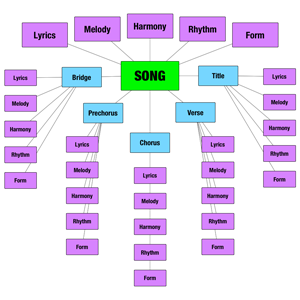-
(Difference between revisions)
Line 6: Line 6: Effective verses should connect to the [[chorus]], build up intensity into the [[chorus]], and strongly contrast the [[chorus]].Effective verses should connect to the [[chorus]], build up intensity into the [[chorus]], and strongly contrast the [[chorus]].- ===Tip===+ === Tips ===- Present the song's story from the singer's point of view. This solves any problems with verb tense, setting, literary point of view, gender, and so on.+ * Present the song's story from the singer's point of view. This solves any problems with verb tense, setting, literary point of view, gender, and so on.- + * Setting your verse's [[melody]] and [[lyrics]] to short notes is more conversational than longer notes. This will help draw your audience into the story. The [[chorus]] can then be made of longer notes, where you emphasize just a phrase or two to make it contrast the [[verse]] and give your listeners the opportunity to think about the [[lyrics]].- === Tip ===+ * Big ideas in the chorus, small details in the verse.- + - Setting your verse's [[melody]] and [[lyrics]] to short notes is more conversational than longer notes. This will help draw your audience into the story. The [[chorus]] can then be made of longer notes, where you emphasize just a phrase or two to make it contrast the [[verse]] and give your listeners the opportunity to think about the [[lyrics]].+ == Common Verse Types ==== Common Verse Types ==Revision as of 03:50, 20 January 2011
Songwriting Infobox 
Song ModelSongwriting Lyrics - Melody - Harmony - Rhythm - Form Song Form Title - Chorus - Verse - Prechorus - Bridge Contents
The Verse
The verse is a recurring song section and is generally the first section of the song that the listener hears. Each time the verse repeats, the melody stays the same but the lyrics generally change. The verse is more like a narrative which tells the story.
Effective verses should connect to the chorus, build up intensity into the chorus, and strongly contrast the chorus.
Tips
- Present the song's story from the singer's point of view. This solves any problems with verb tense, setting, literary point of view, gender, and so on.
- Setting your verse's melody and lyrics to short notes is more conversational than longer notes. This will help draw your audience into the story. The chorus can then be made of longer notes, where you emphasize just a phrase or two to make it contrast the verse and give your listeners the opportunity to think about the lyrics.
- Big ideas in the chorus, small details in the verse.
Common Verse Types
a b a b (rhyme scheme)
Fire and Rain - J. Taylor
I Shall Be Released - B. Dylan
She Loves You - The Beatles
I Want to Hold Your Hand - The Beatles
Back in the Saddle - Aerosmith
a a a a
Roxanne - The Police
Feelin' Alright - J. Cocker
King of Pain - The Police
x a x a
Every Little Thing She Does Is Magic - The Police
New Kid In Town - The Eagles
Born To Be Wild - Steppenwolf
Owner of a Lonely Heart - Yes
a a b b
My Generation - The Who
My Life - The Beatles
Message In A Bottle - The Police
Magic Carpet Ride - Steppenwolf __NOEDITSECTION__
-
Meta
